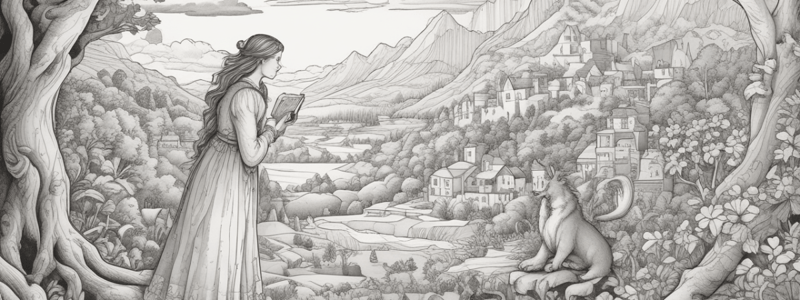Podcast
Questions and Answers
What literary device is used when words that are close together start with the same consonant sound?
What literary device is used when words that are close together start with the same consonant sound?
Alliteration
How does an author create a sense of tension or suspense in a novel?
How does an author create a sense of tension or suspense in a novel?
Foreshadowing
What literary device is used when human-like qualities are given to non-human entities, such as objects or animals?
What literary device is used when human-like qualities are given to non-human entities, such as objects or animals?
Personification
What is the term for the sequence of events that make up the story in a novel?
What is the term for the sequence of events that make up the story in a novel?
What is the term for a recurring theme or idea that is woven throughout a novel?
What is the term for a recurring theme or idea that is woven throughout a novel?
What is the term for the perspective from which the story is told in a novel?
What is the term for the perspective from which the story is told in a novel?
Flashcards
Alliteration
Alliteration
Repetition of initial consonant sounds in closely connected words.
Allusion
Allusion
A reference to something outside the text, like history or mythology.
Hyperbole
Hyperbole
Exaggeration for emphasis or effect.
Metaphor
Metaphor
Signup and view all the flashcards
Motif
Motif
Signup and view all the flashcards
Theme
Theme
Signup and view all the flashcards
Study Notes
Literary Devices
- Alliteration: repetition of initial consonant sounds in words that are close together
- Allusion: reference to a person, place, event, or work of art that is outside the text itself
- Amplification: extension or expansion of a detail or idea to emphasize its importance
- Anaphora: repetition of a word or phrase at the beginning of successive clauses or sentences
- Hyperbole: exaggeration used for emphasis or effect
- Imagery: language that appeals to the senses (sight, sound, touch, taste, smell)
- Irony: contrast between what is expected and what actually occurs
- Metaphor: comparison between two unlike things without "like" or "as"
- Personification: attribution of human qualities or characteristics to non-human entities (e.g. objects, animals)
- Simile: comparison between two unlike things using "like" or "as"
- Symbolism: use of objects, colors, or other elements to represent abstract ideas or concepts
Novel Analysis
- Character Development: how characters change or grow throughout the novel
- Conflict: problem or challenge that drives the plot forward
- Foreshadowing: hints or clues that suggest events that will occur later in the story
- Imagery: language that creates vivid sensory experiences for the reader
- Motif: recurring theme or idea that is woven throughout the novel
- Plot: sequence of events that make up the story
- Point of View: perspective from which the story is told (e.g. first person, third person limited, omniscient)
- Setting: time and place in which the story takes place
- Theme: underlying message or idea that the novel conveys
Forgetfulness and Memory in Literature
- The Psychology of Forgetfulness: how and why people forget, including psychological and neurological factors
- Memory and Identity: how memories shape our sense of self and identity
- Forgetting as a Theme: how forgetfulness is used as a theme in literature, including its symbolism and metaphorical significance
- The Impact of Forgetting: how forgetting affects characters and their relationships in literature
- Memory and Trauma: how memories of traumatic events can be forgotten or repressed, and the impact on characters and their relationships.
Studying That Suits You
Use AI to generate personalized quizzes and flashcards to suit your learning preferences.




